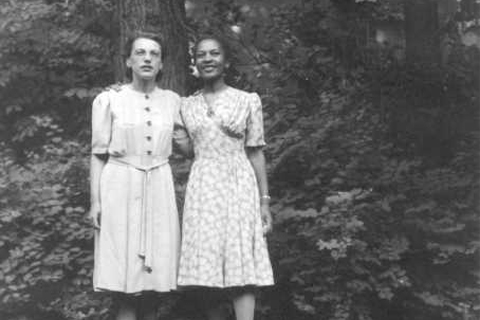 |
 |
|
July 17, 2020 First Bahá’ís in Ottawa Break Racial Barriers In 1940s Ottawa, as the civil service grew larger by the day to support the war effort, an increasing number of women were hired as the men went overseas to fight. Two of them were single women in their late 20s: Lucille Giscome, a young black journalist from Northern Ontario, and Winnifred Harvey, a white college teacher from Manitoba. Both came to Ottawa to work for the Dominion Bureau of Statistics. Winnifred in a lower level management position and Lucille as a temporary clerk. Their offices were cramped, the hours were long, and not only was food rationed, so were office supplies. Those of different ranks within the service were expected to socialize with their peers.  Although Winnifred came from a middle-class old stock Canadian family (her father was a small town mill owner) and Lucille from a modest family (her father was a cook), they had a great deal in common: both were seekers of truth and voracious readers who were looking for careers rather than the safe traditional roles of wife and mother. They were to be the first and second members of the Ottawa Bahá’í Community. Although she had heard of the Bahá’í Faith in Winnipeg, Winnifred undertook her study of the Faith in Ottawa and decided to become a member in June 1940. She ardently wished to share this Faith that to her made the whole world make sense and in which she could find no flaws. She was attracted by the beauty and spirituality of the Writings, but also by the principles such as the individual search for truth and the oneness of humanity. She had met Lucille at the office and invited her out for dinner – something that was not done at that time, not only because Lucille was black, but also because of the difference in their positions at work. Winnifred’s Faith emboldened her to break with the traditions that were expected of her, and Lucille herself was known for her outspoken views. Lucille accepted the invitation and the two young women soon spent a great deal of time together speaking about the Bahá’í Faith. Sometime, probably in 1941, Lucille accepted the Faith as her own. She was active administratively, serving on Bahá’í national committees and attending the Bahá’í National Convention in Chicago as a delegate in 1942. She probably also attended the Race Unity Dinner held at that convention. Soon after, she moved to Toronto, and in 1943 wrote “Man of the People”, a biographical sketch of a well-known political organizer and member of the communist party, A.A. McLeod, who later founded the Ontario Human Rights Commission. In Toronto she continued to be active in Bahá’í activities and attended firesides. |
|
|